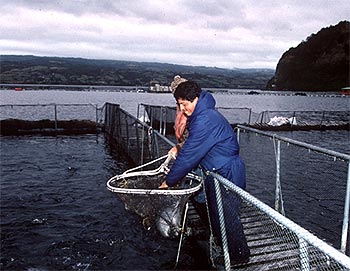|

Logistical problems may delay some farmed salmon harvests in Chile. (Photo: SIGES)
Salmon harvests may be delayed
 CHILE
CHILE
Friday, March 05, 2010, 00:30 (GMT + 9)
The general manager of the Salmon Industry Association of Chile AG (SalmonChile), Carlos Odebret, warned that the supply chain of the salmon farming sector may be affected by last Saturday’s seismic event and tsunami that struck several areas of the country.
Although the earthquake did not cause significant damage to the infrastructure of salmon farming firms, it is possible that some harvests will be delayed, due mainly to logistical problems.
"Without a doubt, this entire situation is going to have some effect if fuel delivery is not regularised, or regarding the oxygen availability for fish-farming centres, among others variants,” the executive indicated.
 |
| General manager of SalmonChile, Carlos Odebret. (Photo: SalmonChile) |
"It is very premature to gauge the effects in terms of amount and volume, but in a few days we hope to have more clarity on the matter,” he added.
Meanwhile, Ernesto Aubel Mohr, a top executive at AquaStar – pertaining to the Norwegian-Chilean group OCEA – urged the salmon industry to organise and coordinate aid for earthquake victims.
"The most dire situation the victims are living through is due to water shortage, and transport trucks for fry with stainless steel pools could be organised to take water to those areas. For this initiative, salmonid producers could be asked to contribute to financing the charter of the trucks. There are several trucks that today have lighter workloads and I believe that the opportunity to help with water could be crucial,” Aubel said.
"At these times it is important for the salmon industry to show its solidarity with the people that need it and for that reason I call on the whole community to move in aid of the victims,” the executive added.
In other news, it is estimated that the city of Talcahuano could take up to two years to return to normal.
The strong tide produced an accumulation of branches, mud, seaweed and bundles of fishmeal in the streets of the area, Diario Financiero reports.
According to initial calculations, fishing companies lost up to 70 per cent of their production, which is the case with the company Alimentos Marinos (Alimar), the most emblematic.
This Wednesday, some workers spent their time cleaning up seaweed and debris left behind by the tsunami.
In the meantime, the managers of Pesquera El Golfo estimate that the company will take between two and three months to become operational.
In any case, it is possible that some units begin working as soon as power and social normalcy is re-established.
The information available on the impact of the catastrophe on the aquaculture-fisheries sector indicates that artisanal fishing will be harmed the most, since many units of the large seafood firms will have to be reconstructed and new vessels acquired to replace those that were destroyed.
The directors and executives of member companies of the National Fishing Society (SONAPESCA) assured that 50 per cent of the installed capacity of fish firms in the central and south zone of the country were totalled by the earthquake and the subsequent swells caused by the earthquake in the Region of the Bio Bio.
Hector Bacigalupo, general manager of SONAPESCA, predicts that the recovery of the industry’s total capacity will take at least a year, El Mercurio reports. The Region of Bio Bio represents around 50 per cent of the seafood production of the country, with close to 1,000,000 tonnes of jack mackerel and 800,000 tonnes of sardine and anchovy annually, in addition to fine fish.
Related article:
- Processing plants looted post-earthquake
By Analia Murias
[email protected]
www.seafood.media
|



